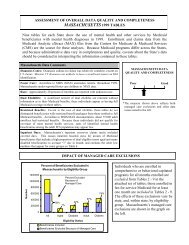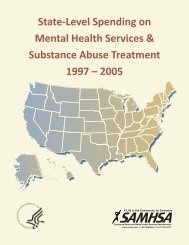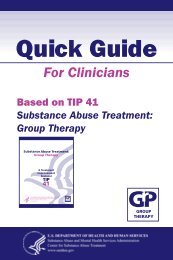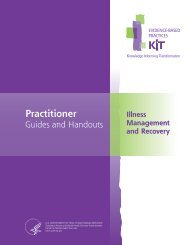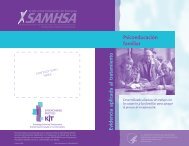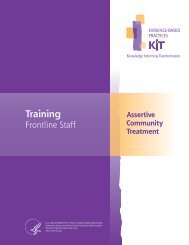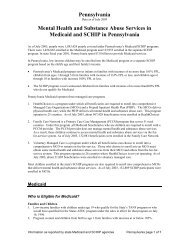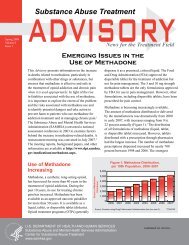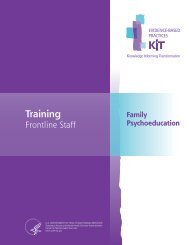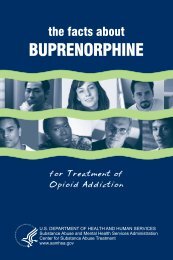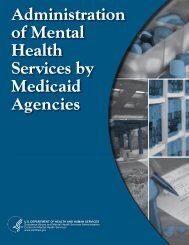Practice Guidelines: Core Elements for Responding to Mental Health
Practice Guidelines: Core Elements for Responding to Mental Health
Practice Guidelines: Core Elements for Responding to Mental Health
Create successful ePaper yourself
Turn your PDF publications into a flip-book with our unique Google optimized e-Paper software.
crises, there may be a presumption that statements made by these individuals are<br />
manifestations of delusional thinking. Consequently, there is a risk that legitimate<br />
complaints relating <strong>to</strong> such matters as medical illness, pain, abuse or victimization<br />
will go unheeded. Even when an individual’s assertions are not well grounded in<br />
reality and represent obviously delusional thoughts, the “telling of one’s s<strong>to</strong>ry” may<br />
represent an important step <strong>to</strong>ward crisis resolution. 13 For these reasons, an appropriate<br />
response <strong>to</strong> an individual in mental health crisis is not dismissive of the person as a<br />
credible source of in<strong>for</strong>mation—factual or emotional—that is important <strong>to</strong> understanding the<br />
person’s strengths and needs.<br />
9. recovery, resilience and natural supports. Certain settings, such as hospital<br />
emergency departments, may see individuals only transiently, at a point when<br />
they are in acute crisis and in a decidedly high-stress environment. Even when<br />
not occurring within hospitals, mental health emergency interventions are often<br />
provided in settings that are alien <strong>to</strong> the individual and the natural supports that<br />
may be important parts of his or her daily life. It is important not <strong>to</strong> lose sight<br />
of the fact that an emergency episode may be a temporary relapse and not<br />
definitional of the person or that individual’s broader life course. An appropriate<br />
crisis response contributes <strong>to</strong> the individual’s larger journey <strong>to</strong>ward recovery and resilience and<br />
incorporates these values.Accordingly, interventions should preserve dignity, foster a sense of<br />
hope, and promote engagement with <strong>for</strong>mal systems and in<strong>for</strong>mal resources.<br />
10. Prevention. Too often, individuals with serious mental illnesses have only<br />
temporary respite between crises.An appropriate crisis response works <strong>to</strong> ensure<br />
that crises will not be recurrent by evaluating and considering fac<strong>to</strong>rs that<br />
contributed <strong>to</strong> the current episode and that will prevent future relapse. Hence,<br />
an adequate crisis response requires measures that address the person’s unmet needs, both<br />
through individualized planning and by promoting systemic improvements.<br />
prInCIples <strong>for</strong> enaCtIng the essentIal values<br />
Several principles are key <strong>to</strong> ensuring that crisis intervention practices embody these<br />
Essential Values:<br />
1. Access <strong>to</strong> supports and services is timely. Ready access <strong>to</strong> assistance is<br />
important not only because it holds the promise of reducing the intensity and<br />
duration of the individual’s distress, but also because as a crisis escalates, options<br />
<strong>for</strong> interventions may narrow.Timely access presupposes 24-hour/7-days-a-week<br />
availability and a capacity <strong>for</strong> outreach when an individual is unable or unwilling<br />
<strong>to</strong> come <strong>to</strong> a traditional service site.<br />
2. services are provided in the least restrictive manner. Least-restrictive<br />
emergency interventions not only avoid the use of coercion, but also preserve<br />
the individual’s connectedness with his or her world. Individuals should not be<br />
unnecessarily isolated from their routine networks of <strong>for</strong>mal and natural supports<br />
and should be encouraged <strong>to</strong> make contact with outside professionals, family and<br />
friends who can provide assistance through the crisis event and beyond.<br />
t<br />
The National Consensus<br />
Statement on <strong>Mental</strong><br />
<strong>Health</strong> Recovery identifies<br />
recovery as an individual’s<br />
journey of healing<br />
and trans<strong>for</strong>mation<br />
enabling a person with<br />
a mental health problem<br />
<strong>to</strong> live a meaningful life<br />
in a community of his or<br />
her choice while striving<br />
<strong>to</strong> achieve his or her full<br />
potential. It also cites 10<br />
fundamental components<br />
<strong>for</strong> systems:<br />
• Self-Direction<br />
• Individualized and<br />
Person-Centered<br />
• Empowerment<br />
• Holistic<br />
• Non-Linear<br />
• Strengths-Based<br />
• Peer Support<br />
• Respect<br />
• Responsibility<br />
• Hope<br />
US Department of <strong>Health</strong> and Human<br />
Services, Substance Abuse and <strong>Mental</strong><br />
<strong>Health</strong> Services Administration, Center <strong>for</strong><br />
<strong>Mental</strong> <strong>Health</strong> Services (2004) National<br />
Consensus Statement on <strong>Mental</strong> <strong>Health</strong><br />
Recovery. For the complete report, see:<br />
http://mentalhealth.samhsa.gov/publications/<br />
allpubs/sma05-4129/<br />
7



